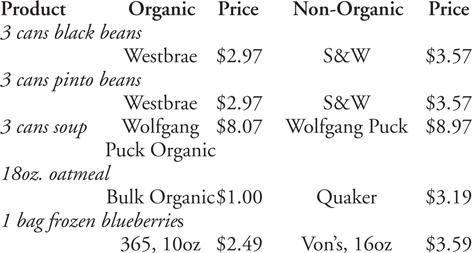
STEP #11
Buy Organic
If you think about it, nature intended for us to eat organically. Organic, or natural, food is grown using earth-friendly farming methods sans synthetic fertilizers and pesticides. Buying organic food is good for our bodies, good for the earth and good for the U.S. economy. Believe it or not, choosing organic foods is another simple step we can take toward kicking our oil habit.
Many of us don’t think about the amount of oil that was required to put our food in front of us. Surprisingly, it takes 10 fossil fuel calories for every food calorie produced in the United States. This includes the oil used to power the tractors, make the fertilizers and chemicals, and process and transport the food. Reportedly, the “biggest culprit of fossil fuel usage in industrial farming is not transporting food or fueling machinery; it’s chemicals,” says Sustainable Table (www.sustainabletable.org). They estimate that about 40 percent of energy used in the food system goes toward producing and distributing artificial fertilizers and pesticides and requires about 5.5 gallons of fossil fuels per acre.
Understandably, supporting sustainable farming methods by choosing organic foods is a healthy way to break our oil addiction. Sustainable farms often graze animals on their fields, allowing fertilization of the soil to take place naturally and eliminating the need for fuel and fertilizer. An estimated one billion dollars could be saved on petroleum-based fertilizers and pesticides if the U.S.’s major croplands practiced sustainable farming methods.
Other organic farming methods like no-till farming further cut the need for oil. As no tilling is required, there is no need for diesel-powered, oil-eating tractors and heavy equipment, saving, according to the USDA, about 3.9 gallons of diesel fuel per acre of land.
Buying organic foods is one of the best things you can do to contribute to a healthy, big picture. Your body, the earth, the economy and the environment all benefit. And fortunately, the benefits of organic foods don’t come with a hefty price tag. A shopping survey published in The Doctors’ Prescription for Healthy Living magazine, which is found at all of the nation’s leading organic food markets and health food stores, shows that organic foods often cost less than processed foods. “On many items, the price difference was negligible (one lb. of organic spaghetti was $1.29 compared to $1.19 for non-organic), or the organic item was actually cheaper; for example, a 10-ounce box of Cheerios was $3.79, while a 10-ounce box of New Morning organic Oatios was only $2.69!”


And finding organic foods, as you will discover in the next few steps, is as easy as going down to your local farmers’ market.